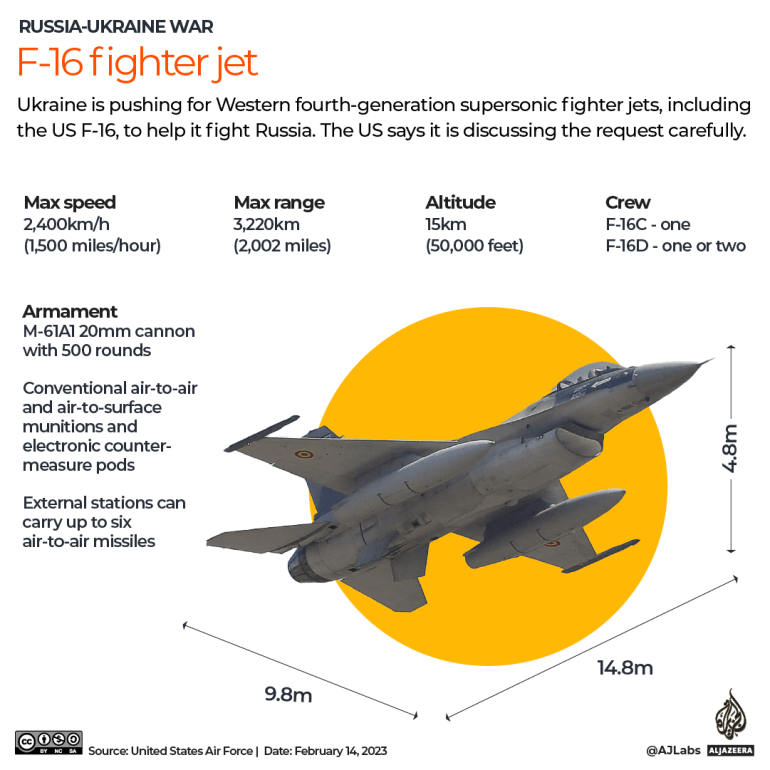Russia will not achieve a military victory in Ukraine and Kyiv’s forces are unlikely to push back all Russian troops from their territory any time soon, the United States’s highest-ranking military official has said.
“This war, militarily, is not going to be won by Russia. It’s just not,” General Mark Milley, chairman of the US Joint Chiefs of Staff, said on Thursday.
Russia’s original strategic objectives, including toppling the government in Kyiv, “are not achievable militarily”, Milley told journalists after the conclusion of a virtual meeting of dozens of countries that are members of the Ukraine Defense Contact Group, which is also known as the Ramstein group.
There are also hundreds of thousands of Russian soldiers in Ukraine, which would make Kyiv’s objective of recapturing all territory lost to Moscow’s forces unlikely “in the near term”, Milley said.
“That means fighting is going to continue, it’s going to be bloody, it’s going to be hard. And at some point, both sides will either negotiate a settlement or they’ll come to a military conclusion,” he said.
Milly’s assessment adds to a number of forecasts that the war in Ukraine appears set to drag on, with neither side positioned to win a clear-cut victory and no negotiations currently taking place.
Russia’s former President Dmitry Medvedev, a key ally of President Vladimir Putin, also said Moscow’s war in Ukraine could continue for decades.
According to comments published by Russia’s RIA news agency on Thursday, Medvedev described an ongoing conflict involving years of fighting with Ukraine, interspersed with multiple years of truces before fighting renewed.
“This conflict will last a very long time, most likely decades,” the RIA news agency cited Medvedev as saying during a visit to Vietnam.
“As long as there is such a power in place [in Kyiv], there will be, say, three years of truce, two years of conflict, and everything will be repeated,” said Medvedev, now the deputy chairman of Putin’s powerful Security Council.
Known for regularly making hardline comments on Ukraine and those considered Moscow’s enemies, Medvedev said earlier this year that a Russian defeat could trigger a nuclear war.
Tensions between Moscow and Washington continues to grow as the US spearheads the push for international support and military aid for Ukraine, including coordinating arms supplies from dozens of countries. In an apparent policy U-turn, the US last week announced it would support giving Ukraine advanced US-made F-16 warplanes.
In total, Ukraine’s supporters have provided nearly $65bn in security assistance to the country, US Defence Secretary Lloyd Austin said at the press conference on Thursday.
No ‘magic weapons’
On Thursday, Kyiv’s supporters “discussed plans for training Ukrainian pilots on fourth-generation fighter aircraft, including the F-16,” Austin said, speaking alongside Milley, noting that “planning and executing this training will be a significant undertaking”.
Austin said the Dutch and Danish defence ministers are working with the US on jet fighter training for Ukraine and that Norway, Belgium, Portugal and Poland have already offered to contribute to the initiative.
In addition, he said the allies would set up a fund so other nations could contribute to the overall effort.
Commenting on the F-16 fighters, Milley cautioned that they were not going to be “the magic weapon”.

“There are no magic weapons” – not the F-16s or other weapons, he said, noting that 10 F-16s could cost $2bn, including maintenance.
“The Russians have a thousand fourth and fifth-generation fighters, so if you’re going to contest Russia in the air, you’re going to need a substantial amount of fourth and fifth-generation fighters,” he said.
F-16s have a future role as part of Ukraine’s air capabilities but it is “going to take a considerable length of time to build up an air force that’s the size and scope and scale that would be necessary”.
Air defence systems are still the weapons that Ukraine needs most in the broader effort to control the airspace, he said.
The US is poised to announce up to $300m more in military aid for Ukraine comprised mainly of ammunition, two officials told the Reuters news agency. The package is expected to contain more Guided Multiple Launch Rockets (GMLRS) for HIMARS launchers as well as other ammunition.
The Institute for the Study of War, a Washington DC-based think tank, said that “a long war” is not a Russian goal but a means of adapting to the situation in Ukraine after its plan for a swift victory failed. Russia’s ability to sustain an extended military campaign in Ukraine is not assured, while a “long war” would allow Russia the time and space needed to rebuild its military forces, the institute said.
“Ukrainian counteroffensives will deny the Kremlin a breather to replenish its resources, will further deplete Russia’s offensive potential, and eventually enable Ukrainian forces to expel Russia from Ukraine,” the ISW said.
“The Kremlin’s ‘long war’ narrative reflects Putin’s intent to rebuild Russia’s large-scale warfighting capability. But it is also an information operation aimed to peel the West away from Ukraine. This information operation builds on previous Russian efforts, such as ceasefire narratives and nuclear blackmail,” the ISW added.
Source : AlJazeera


